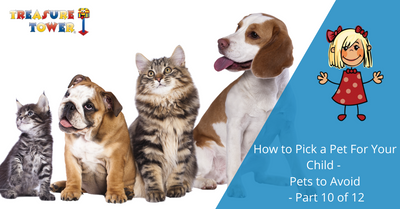Pets To Avoid - Part 10 of 12
Treasure Tower Rewards Canada Ltd. on 2023 Feb 4th

Pets To Avoid - Part 10 of 12
Obviously, you will want to avoid any pet that can potentially harm your children. Aggressive dogs such as pit bull terriers who are mainly bred for fighting, should not be around children. Those who have these animals will balk at such a statement and defend the breed. However, you only have to read the paper to find incidents of these animals attacking and even killing young children.
Those who are really into animal rights will blame the humans for the dog’s behavior and in most cases, they are right. Dogs are not born to be mean. But some dogs do have more aggressive traits than others and do not make an ideal pet for kids. While dog advocates will disagree, do you really want to take a chance when it comes to your kids?
Large dogs that are built for protection, such as Dobermans, Rottweilers and German Shepherds are loyal dogs that make good companions for humans. German Shepherds are incredibly smart dogs which is why they are used in police work. Presas, Chows and Akitas are attractive animals, but have been known to be aggressive. You are better off not having one of the these type of breeds with small children.
Any dog that appears to have been mistreated may also be aggressive. If you are adopting a dog out of the pound, try to see about its history before bringing it around your children. Most animal shelters have a place where you can interact with the dog. This gives you a perfect opportunity to see how the dog gets along with your children. Dogs who appear aggressive or who growl at your children, are not the ideal pet.
You never, ever want to have your children afraid of their own dog. You also never want to leave a dog, any dog, around a young child unsupervised. Dogs are animals and animals do not know how to reason. Never trust any animal around a baby.
With young children, you are better off getting a kitten if you are thinking of getting them a cat. Kittens will get used to being handled if they are handled frequently when young, and as long as you teach your children respect for the animals, they will not bite or scratch. Small children, however, should be supervised around cats.
If you have children in your house, you are better off to get an indoor cat. The cat will not go out and bring in any sort of diseases from the outside. Indoor cats tend to live a lot longer because they are not out in the elements, do not get exposed to diseases from other cats and avoid fights.
There are pure bred cats available at catteries throughout the United States. Some people really want Persian or a Maine Coon or Siamese cat. These cats are beautiful animals, but generally a bit high strung. They often have a very predictable behavior and may or may not make a good pet for a child. Some cats, such as Siamese cats, tend to “talk” quite a bit. They are always meowing. These cats can be a fun pet although they have a reputation of being “aloof.”
You are much better off adopting a kitten for your child than getting a pure bred cat from a cattery. This is for the sake of your children as well as the animals. There are so many cats looking for homes in adoption centers that it seems criminal to actually seek out more cats from breeders. Unless you are thinking of showing a cat in a cat show, consider getting a kitten or a cat from the local animal shelter.
Some cats will hiss when frightened, this does not mean that they are aggressive. Teach your children not to threaten the cat or behave in an aggressive manner towards the animal.
Unlike dogs, a new kitten or cat that you bring home is liable to run and hide under a sofa, bed or some other “safe” place until he or she feels that it is okay to come out. This could be several days. Put food and water out for the cat, show him or her the litter box and be patient. The cat will come out when he or she is ready to be part of the family.
Some cats will not be scared. They may be as bold as brass and start taking over the family right away. This is usually the sign of a spunky animal that will most likely give you years of pleasure.
Cats can live for up to 20 years or more with proper care. For the most part, they make fine pets for both children and adults. If you treat the cat with kindness as a kitten, handle it often and gently, it will be receptive to the humans in the house, including the children.
Unlike dogs, cats do not live to “please.” They are also unlikely to answer to their name. For the most part, they live in a world of their own in which they are the owners of the house and you are the intruder.
However, they do learn to become somewhat social with their human companions over a period of time, as long as they are treated kindly.

